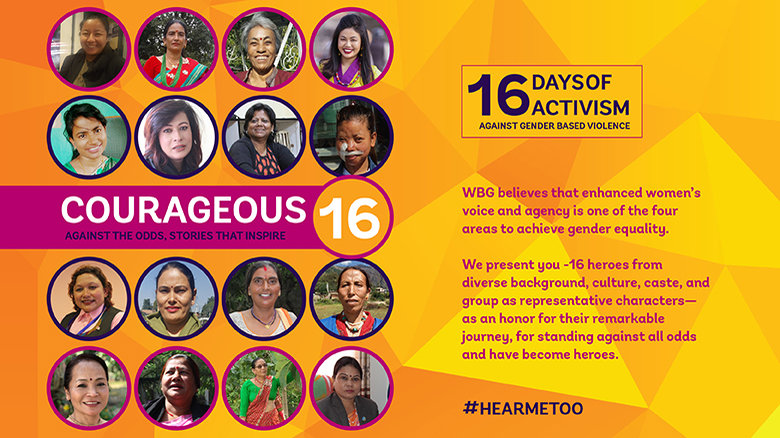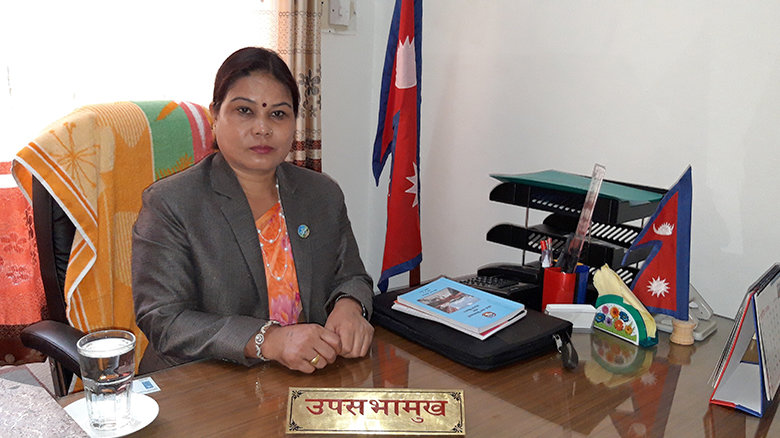Krishni Tharu - Bardiya, Deputy Speaker, Province 5, Nepal
This story is one of 16 stories on heroes from Nepal who made a remarkable journey and inspired others toward achieving equality and empowerment. All stories are available here.
Born into a poor indigenous Tharu family in Rajapur village of Bardiya, in south-western Nepal, Krishni became a kamlari (a traditional system of female bonded labour) at the age of seven for NRs 100 (approximately U$1) per year. Her father used to work as a gardener in the landlord’s house and sent his daughter to work for the same family.
Recounting her time as a kamlari, Krishni shared how she would struggle to care for the landlord’s six-month old baby. “I didn’t know how to take care of a baby,” she recalls. “I would get beaten every time I carried the baby in the wrong way.” After looking after the baby for a year, her task changed to cleaning the whole house including washing the dishes and clothes. She only got to eat leftovers, which was generally watery daal (lentil soup).
Whenever there was a party at the house, requiring Krishna to stay late, she would have to sleep on the floor as her home was an hour's walk away and she was too scared to walk alone at night. She remembers, “I was just a child, and due to fear and the cold, I would sometimes relieve myself in my sleep on the jute mattress. My mistress would then beat me up in the morning and make me take a cold shower, even in the winter. I would cry a lot.”
She thought her life as a kamlari life would end after her landlord’s family moved to Kathmandu. Instead she was sent to another landlord’s house for six years where she only received a set of clothes a year. When Krishni got married at the age of 15, she became a bukarahi, another form of bonded labor, alongside her husband, but did not receive anything for her work. Her husband received 12 sacks of rice, 6 kg of wheat and 1 kg of mustard seed per year.
Unbearable suppression leads to looking for a way out
Despite working all day at the landlord’s house, the food Krishni and her husband received was inadequate to feed their family of four. The couple also endured humiliations, insults and abuse at the hands of landlord. She considered that this was something almost all the bonded laborers experienced and that no one could protest against such practices. “I realized that we were being treated like beings with anything of our own, neither shelter nor income,” Krishni says, “We were at the mercy of our landlords and this made them powerful.”
It was then that a movement to free kamaiyas (traditional system of bonded labour) started. Krishni felt that she and her husband could not work in her landlord’s house all their lives. Being interested in the “Kamaiya movement”, she later became actively involved in the movement. In 2000, the Government of Nepal abolished the kamaiya system, requiring that all Kamaiyas be freed.
From Free Kamaiya activist to Deputy Speaker
Krishni realized that it was women and children who suffered the most in the face of poverty. There were many cases of violence against women due to poverty and she felt that women should be at the decision-making level of Government in order to effectively advocate for improving living standards of women.
In 2001 she became a member of Free Kamaiya Society, an advocacy group seeking land and employment rights for Kamaiyas of Bardiya district, and became its Vice President in 2003. In 2009, Krishni became the President of Women's Awareness Society, a forum of women fighting against the discrimination of, and violence towards, women. Through this organization, Krishni started providing educational, vocational and life-skill trainings to women, and also conducted trainings in marketing skills to help women sell their products. During this time, in 2010, the Government enacted a law to allot land and distribute land ownership registration certificates to freed Kamaiyas. However, eight years later, Krishni is still fighting for its implementation.
In 2016, when the Government announced that it would provide NRs. 150,000 ($1 = NRs. 113) loan to freed kamaiyas, Krishni protested and demanded that the Government instead provide a rehabilitation package of 5 kattha (3,600 square feet) of land and NRs. 10,000 to the kamaiyas. Despite facing numerous challenges, she continued to advocate for the rights of kamaiyas. “The provision of rehabilitation program is being delayed,” she says, “But we have not deviated from our mission.”
Krishni felt that the next step was for her to enter politics, and filed her nomination as member in the State Assembly with the Communist Party of Nepal–United Marxist Leninist and was elected. Later, at the age of 42, she was elected as Deputy Speaker in Province 5, receiving 66 votes in the election against her opponent’s 19 votes.
Now that she has been elected as a Deputy Speaker in Province 5, she feels that she has an even bigger responsibility towards Tharus and other marginalized communities living in the province. She says, “I am at a decision-making level with strong team of experts to review policies, and I have already started work to revise policies that are contradictory to free Kamaiya movement.”


